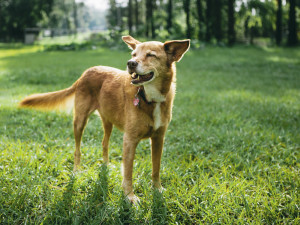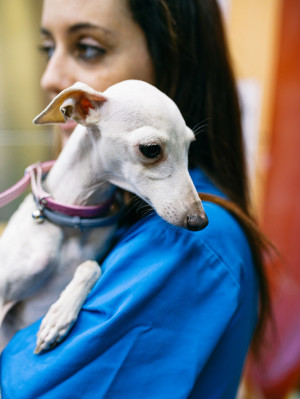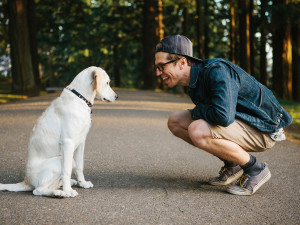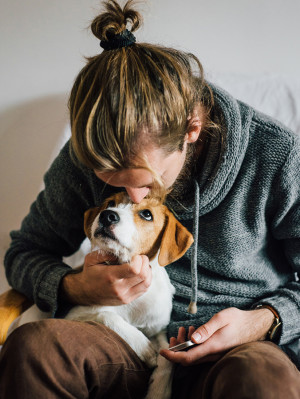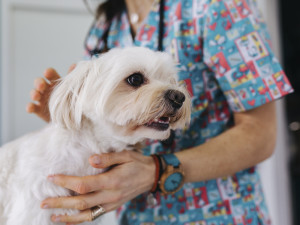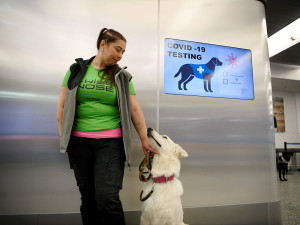Can Dogs Get COVID?
The pandemic started nearly four years ago. Here’s what we know about dogs and COVID now.
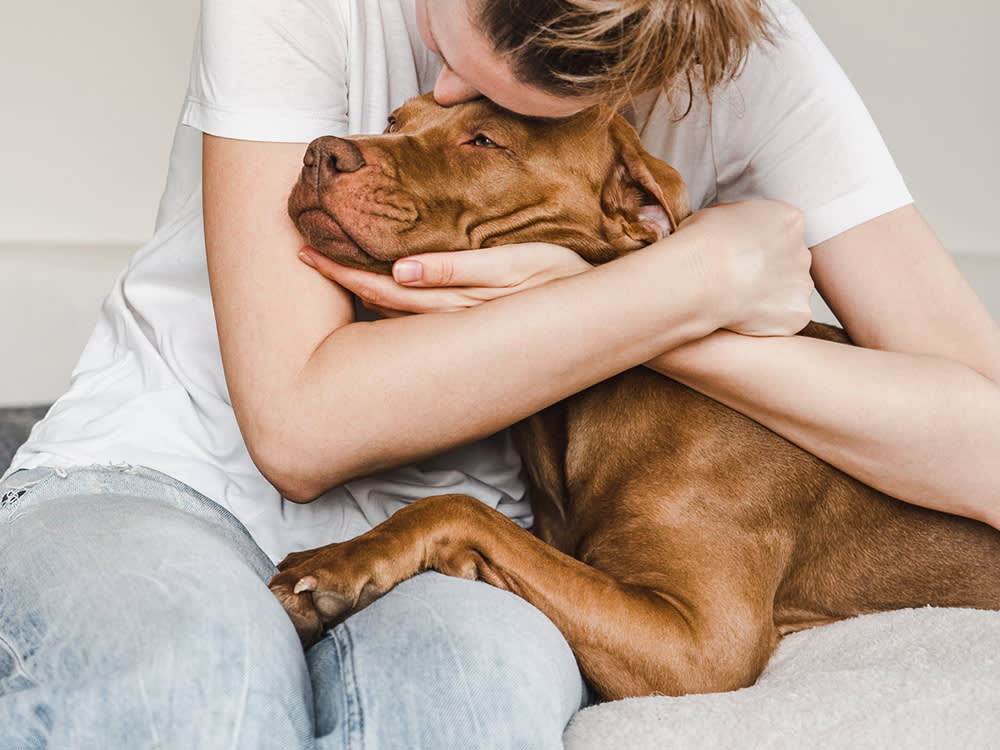
share article
In this Article:
Can Dogs Get COVID?opens in a new tab How Is COVID Transmitted to Dogs?opens in a new tab Symptoms of COVID in Dogsopens in a new tab Prevention of COVID in Dogsopens in a new tab
Dogs can get COVID-19, but it is rare for them to become very ill from the virus. The virus can spread from people to dogs during close contact, but spread from dogs to people is very unlikely. Dogs with COVID-19 may have mild or no symptoms, but some dogs may develop more serious illness. If you are concerned that your dog may have COVID-19, contact your veterinarian.
What is COVID?
Not that you need reminding after multiple years of trauma as the result of a global pandemic, but COVID-19 is a particularly nasty and contagious virus that primarily affects humans. Even nearly four years after the virus appearedopens in a new tab, there are still many things we don’t know about its effects on people and animals.
COVID-19 (coronavirus disease 2019) is caused by a novel β-coronavirus called severe acute respiratory syndrome-coronavirus-2 (SARS-CoV-2). It likely jumped species from bats to humans near Wuhan, China in late 2019. It spread quickly around the world after that, and everyone is still dealing with the fallout of that to this day. There have been at least 770 million confirmed casesopens in a new tab and about seven million confirmed deaths from COVID-19, though the true numbers for both are likely significantly higheropens in a new tab.
These types of coronaviruses are very adept at mutating and adapting to new hosts, which means that the virus is able to spread to numerous animal populations, even if it doesn’t cause significant disease in each one. It also means that the virus changes enough that its primary host, humans, can get infected repeatedly with each mutation. Although dogs can get infected with the virus, it’s uncommon for them to have obvious symptoms of infection.
Can dogs get COVID?
Much of the research around COVID in dogs has focused on its prevalence and the possibility of dogs transmitting the virus to people. As with human COVID infections, knowledge about canine COVID is evolving with time. Multiple studies have shown that dogs can be both naturallyopens in a new tab and experimentallyopens in a new tab infected with COVID. Despite the boom of dog adoptionsopens in a new tab during the pandemic, dogs have seemed unaffected by the virus. Hopefully this will continue to be the case as the virus mutates.
How many dogs have contracted COVID?
It’s impossible to know how many dogs have been infected by COVID. A 2023 reviewopens in a new tab showed a seroprevalence (presence of antibodies against COVID, which indicates previous exposure to the virus) of less than one percent in dogs whose parents had not knowingly had a COVID-19 infection. This figure jumped up to over 10 percent in dogs with parents who had a known COVID infection. Overall, presence of antibodies to the virus seem to be present in less than five percent of dogs.
How is COVID transmitted to dogs?
The major cause of COVID in dogs seems to be sharing a space with infected humans. The virus is transmitted primarily by respiratory secretions spread during coughing or sneezing. Dogs are often in close contact with infected people when they are at home, where they are less likely to be wearing masks or other personal protective equipment. This means that dogs are more likely to be exposed to the virus while sharing this enclosed space.
There is mixed evidence regarding transmission to dogs from other species at this point. It’s likely that some animals that shed higher amounts of the virus, like cats and mink, would be able to infect a dog if they were in close contact. There is evidence that dogs experimentally infected with the Delta variant of COVID were able to transmit it to other dogsopens in a new tab they were housed with.
What are the symptoms of COVID in dogs?
Most dogs infected with COVID never show any symptoms. This doesn’t mean that the virus has no effect on them, though. A Korean studyopens in a new tab showed inflammation within the brain and lungs of dogs infected with the Delta variant of COVID both through direct inoculation and natural spread from other dogs. Despite the inflammatory changes seen in the brain and lungs of these dogs, no obvious external symptoms were noted.
One dog infected with COVID-19 in Portugalopens in a new tab had gastrointestinal symptoms, though it is unknown if this was due to the virus or other issues. The common symptoms seen in humans, such as coughing, fever, pneumonia, malaise, and neurological problems do not seem to be commonly seen in dogs.
Is there treatment for dogs who contract COVID?
Dogs that contract COVID should be monitored at home for the development of any symptoms. As a precaution, they should have minimal contact with any house members who are not sick from COVID. Keep them isolated from other pets at home and in public for at least a week after infection. If you are concerned your dog is sick from COVID, contact your veterinarian’s office before arrival so they can take precautions to protect their staff and other animals in their care. If needed, treatment would likely be supportive and take place in an isolation room to prevent spread of the virus.
Can dogs spread COVID to humans?
It’s generally acceptedopens in a new tab that dogs do not currently act as a reservoir host for the spread of COVID to humans. That’s not to say it’s impossible for a dog infected with COVID or living with people infected with COVID to transmit the disease. But dogs shed little to no COVID virusopens in a new tab when infected experimentally and there have not been confirmed reports of direct transmission from dogs to people.
Dogs can carry the virus on their furopens in a new tab when they are exposed to humans who are shedding the virus. Direct transfer from surfaces is an uncommon source of COVID infection in humans, but there is a small risk of infection by this means. It’s best to practice good hygiene when handling a dog from a household with an unknown or positive COVID status. If someone in your house has COVID, prevent others from coming into contact with your dog as much as possible.
Can you prevent your dog from getting COVID?
Prevention of COVID in dogs is not nearly as well-studied as it has been in humans. Personal protective equipment is not intended or verified for use in dogs, so many of the measures people take to protect themselves and others do not apply to dogs. There is not a COVID vaccine approved for use in dogs. There is a vaccination approved for a canine coronavirus, but it does not protect against COVID. It’s also not recommended as a part of core vaccines for puppies or adult dogs because the canine coronavirus has mutated significantly since the vaccine was developed.
Although dogs are unlikely to show any adverse effects if they are infected by COVID, it’s best to prevent exposure if at all possible. This means keeping your dog away from crowded situations, people with known cases of COVID, and animals from households with COVID infections.
Can dogs help in the fight against COVID?
In addition to helping their parentsopens in a new tab through isolation and reintroduction into society, dogs may be able to serve as sentinels to help limit the spread of COVID. A November 2023 trial studyopens in a new tab showed that scent-detection dogs can recognize the presence of COVID-19 infection in humans with good accuracy — about 95 percent for both the presence and absence of disease.
The dogs were able to detect the scent quickly (within five to 10 seconds) and in some cases were able to detect the presence of the virus two to three days before testing showed up positive. The study was limited to only two dogs, but it shows promise for the use of dogs in assisting with public healthopens in a new tab screenings.
FAQs (people also ask):
Can dogs be carriers of the virus without showing symptoms?
Just like humans, dogs can be infected by COVID-19 without showing symptoms. Dogs are not known to have transmitted the virus to humans and seem to have minimal shedding of the virus while they are infected.
Should I get my dog vaccinated against COVID?
There is no vaccination against COVID approved for use in dogs. Because dogs appear to be largely unaffected by the disease, canine COVID vaccination is not a priority at this time.
Can other pets, like cats, get COVID?
Many other animals, including catsopens in a new tab, ferrets, and hamsters, can become infected with COVID. Cats seem to be more commonly affected by the virus than dogs and may be able to transmit it to other cats and humans.
References:
A Novel Coronavirus from Patients with Pneumonia in China, 2019opens in a new tab
14.9 Million Excess Deaths Associated With the COVID-19 Pandemic in 2020 and 2021opens in a new tab
Neurologic Effects of SARS-CoV-2 Transmitted Among Dogsopens in a new tab
Companion Animals lLkely Do Not Spread COVID-19 But May Get Infected Themselvesopens in a new tab

Dr. Bartley Harrison, DVM
Dr. Bartley Harrison, DVM is a small animal veterinarian based in North Carolina who has practiced emergency medicine since graduating from the Texas A&M College of Veterinary Medicine. His primary interest areas include pain management, cardiology, and the treatment of shock.
He is a member of the Veterinary Emergency and Critical Care Society, American Veterinary Medical Association, and American Medical Writers Association. In addition to his clinical work, he writes pet health articles to help provide accurate information for both new and experienced pet parents. When he’s not working, he enjoys cooking, traveling, reading, and going on adventures with his dog.
Related articles
![Man Kissing And Hugging a small white and brown dog.]() opens in a new tab
opens in a new tabA Mysterious Illness Is Making Dogs Across the Country Sick
Get all the info about this highly contagious respiratory illness—including its possible origins.
![Cavalier King Charles spaniel puppy running in a garden]() opens in a new tab
opens in a new tabParvovirus: How to Identify and Treat Parvo Symptoms in Puppies
The potentially deadly virus can be prevented with one simple step.
![A happy woman is lying on a bed, her dog smelling her face.]() opens in a new tab
opens in a new tab9 Diseases You Can (and Definitely Can’t) Catch From Your Dog
Here’s what you can scratch off your “Worry About This” list.
![A dog coughing]() opens in a new tab
opens in a new tabA Dog in Massachusetts Died After Showing Signs of Kennel Cough—Here’s How You Can Protect Your Pup
Everything you need to know about this super contagious disease. (Hint: There’s a vaccine.)
- opens in a new tab
Does Your Dog Need a Flu Shot?
“Sick as a dog” isn’t just a phrase.
![Woman wearing a neon green t-shirt, black pants, and a grey vest gesturing to a white dog on a leash while standing in front of a sign on a metal wall that reads "COVID-19 Testing"]() opens in a new tab
opens in a new tabCOVID-19 Isn’t Going Anywhere. Enter Dogs Who Can Sniff It Out
The answer to every (seemingly never-ending) crisis: Dogs.

